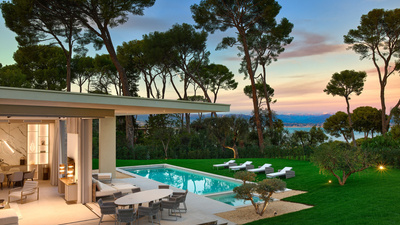Sotheby's International Realty
- 74 boulevard de la Croisette
- 06400 CANNES, France
- +33 4 92 92 12 88
Sotheby's International Realty
- 37 boulevard Marinoni
- 06310 BEAULIEU SUR MER, France
- +33 4 92 92 12 88
Sotheby's International Realty
- 3 avenue Denis Semeria
- 06230 SAINT JEAN CAP FERRAT, France
- +33 4 92 92 12 88
Sotheby's International Realty
- 9 avenue Paul Roussel
- 83990 SAINT TROPEZ, France
- +33 4 92 92 12 88
Sotheby's International Realty
- 5 rue Longchamp
- 06000 NICE, France
- +33 4 92 92 12 88
The Cannes Film Festival: a pillar of cinema and the Côte d'Azur
CÔTE D'AZUR & CINEMA

Since its first edition in 1946, the Cannes Film Festival has become much more than a simple cinematic event. This annual celebration of the seventh art has shaped the film industry and has also played a major role in projecting the luxurious, glamorous image of the Côte d'Azur, as well as in Cannes' success as a festival city.
The fascinating history of the Cannes Film Festival
The Cannes Film Festival emerged from the initiative of Philippe Erlanger and Jean Zay, then French senior civil servant and Minister of National Education and Fine Arts respectively. They wanted to create an international event dedicated to cinema after the First World War. The first edition, scheduled for 1939, was cancelled due to the outbreak of the Second World War.
However, in 1946, Zay's vision finally came to fruition. The city of Cannes, with its enchanting Mediterranean climate and reputation for elegance, was chosen as the ideal setting to host this film festival. The first edition, held from September 20 to October 5, 1946, brought together filmmakers and actors from all over the world, despite post-war difficulties.
Since then, the Cannes Film Festival has become a key annual event for the film industry. Its famous red carpet, prestigious screenings and international jury have contributed to its aura and worldwide renown. Over the decades, the festival has gone through various evolutions, but it has always retained its status as an exceptional showcase for world cinema.
Note: what is now known as the "Cannes Film Festival" was actually called the "Film Festival" from 1946 to 2002. For the 2003 edition, the festival changed its name to its long-standing moniker, "Festival de Cannes" or "Cannes Film Festival", sealing the Mediterranean city's posterity forever.
Throughout its history, the festival has faced many challenges, but it has always been able to adapt and evolve to remain relevant. Its commitment to discovering new talent, promoting innovative films and celebrating cinematic diversity has consolidated its position as a major cultural event.
In this way, the history of the Cannes Film Festival is closely linked to the evolution of cinema itself, and its long history bears witness to the changes and advances of this dynamic industry.
The emergence of an international film scene
The Cannes Film Festival has rapidly become one of the most prestigious events in the world of cinema. Every year, directors, actors, producers and enthusiasts gather to celebrate the diversity and creativity of the cinematic art. The famous steps of the Palais des Festivals have become the emblematic place where stars from all over the world parade, creating a spectacle that is both media-friendly and artistic.
Cannes has provided a launching pad for many of the cinematic masterpieces that have made history. Films such as Quentin Tarantino's "Pulp Fiction", Francis Ford Coppola's "Apocalypse Now" and Federico Fellini's "La Dolce Vita" all premiered at Cannes, propelling their worldwide success.
Economic and cultural impact on the Côte d'Azur
Beyond its influence on the world of cinema, the Cannes Film Festival has greatly contributed to the Côte d'Azur's image as a destination of luxury and glamour. Every year for the duration of the festival, the region welcomes thousands of visitors, from celebrities to film buffs, generating a significant economic impact.
The magnificent landscapes of the Côte d'Azur, with its sun-kissed beaches, prestigious palaces and exclusive evening events, become the perfect backdrop for the festival's parallel events, reinforcing the image of a region associated with refinement and elegance.
Historical anecdotes and key moments
Among the emblematic moments of the Cannes Film Festival, we remember the Stolen Palme d'Or in 1954. The award had been stolen from an exhibition case and was only found a few days later, buried in a field, before being presented to the winner, director Jules Dassin for his film "Du rififi chez les Hommes".
We also remember the 1960 edition, when Alfred Hitchcock, after winning a prize, gave the shortest speech in the festival's history. He simply said "Thank you" before leaving the stage, leaving the audience amused by his concise humor.
Finally, in 1994, the screening of Quentin Tarantino's "Pulp Fiction" was a defining moment for the festival. The film received a standing ovation, propelling Tarantino and his work into the ranks of the unmissable, making the Cannes Festival a launching pad for cult films.
The Cannes Film Festival remains a key event in the world of cinema, not only as a showcase for films from around the world, but also as a catalyst for the Côte d'Azur's image as a prestigious destination. Its cultural heritage, defining moments and influence on the film industry make it an undeniable pillar of the global film scene.
In short, the Cannes Film Festival, with its long history and lasting impact, continues to symbolize the alliance between cinema, glamour and the magnificence of the Côte d'Azur.






